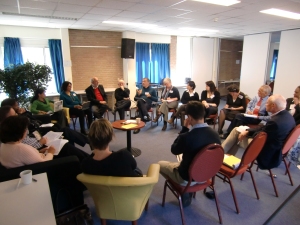Measuring the impact of knowledge management is a hot topic in international development circles and many of us are trying to find ways to effectively measure and demonstrate the results of our investments in knowledge and learning to understand how these investments help us achieve our development objectives faster, more effectively, more efficiently, and/or with greater impact. We all know that there are no simple answers or one-size-fits-all approaches but there is increasing consensus that we need to work together to address these challenges by asking ourselves difficult questions and exploring the context of emerging solutions. Continue reading
Filed under: Uncategorized | Tagged: knowledge management, learning, M&E, monitoring and evaluation, tools | Leave a comment »



